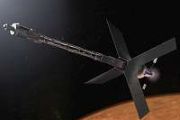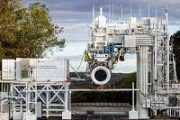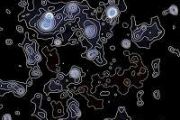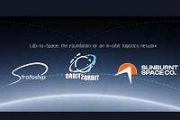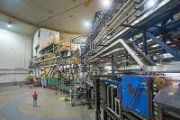
Copernical Team
Vega-C: watch the launch 13 July
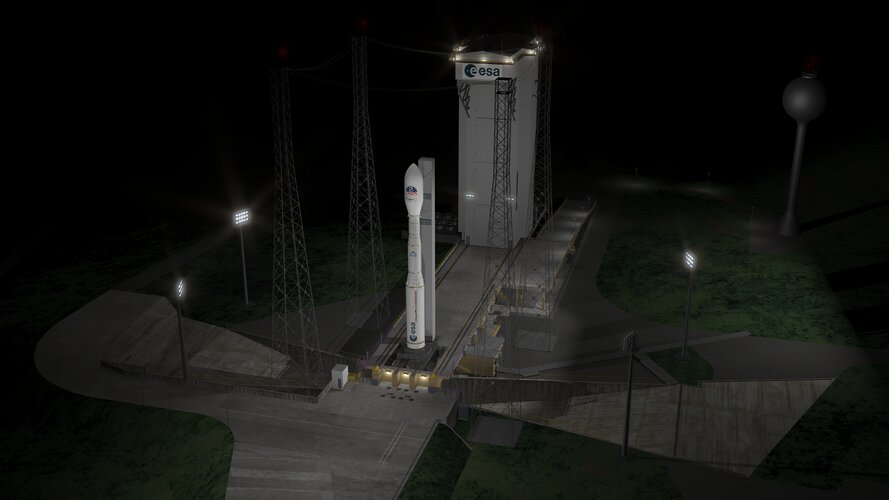
ESA’s new medium-lift Vega-C rocket is nearly ready for its inaugural flight. You can follow live on ESA Web TV. Flight VV21 will lift off as soon as 13 July at 13:13 CEST, pending suitable conditions for launch.
Broadcast begins 12:45 CEST/11:45 BST on ESA Web TV
13:13 CEST/12:13 BST – liftoff
NASA releases James Webb telescope 'teaser' picture
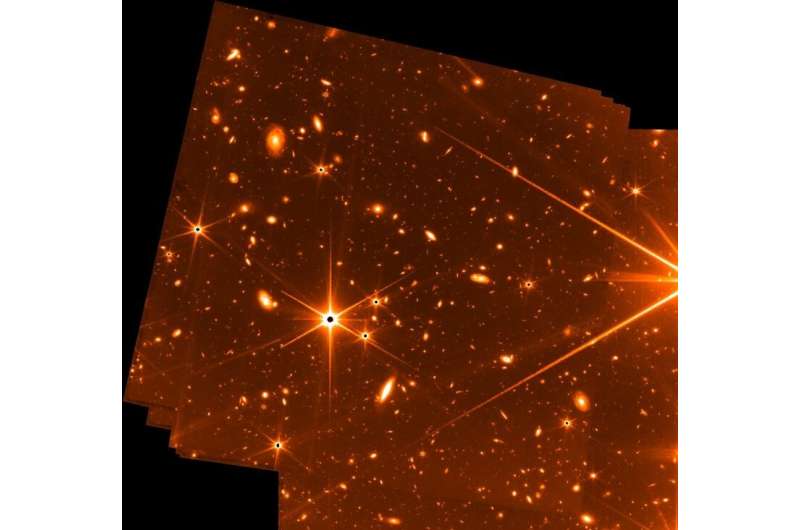
NASA has a provided a tantalizing teaser photo ahead of the highly-anticipated release next week of the first deep-space images from the James Webb Telescope—an instrument so powerful it can peer back into the origins of the universe.
The $10 billion observatory—launched in December last year and now orbiting the Sun a million miles (1.5 million kilometers) away from Earth—can look where no telescope has looked before thanks to its enormous primary mirror and instruments that focus on infrared, allowing it to peer through dust and gas.
The first fully formed pictures are set for release on July 12, but NASA provided an engineering test photo on Wednesday—the result of 72 exposures over 32 hours that shows a set of distant stars and galaxies.
NASA Updates Coverage for Webb Telescope’s First Images Reveal
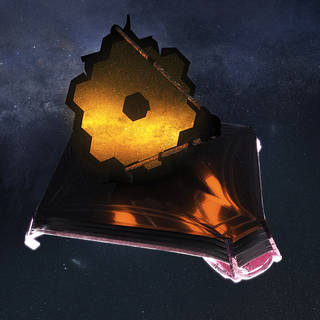 NASA, in partnership with ESA (European Space Agency) and CSA (Canadian Space Agency), will release the James Webb Space Telescope’s first full-color images and spectroscopic data during a live broadcast beginning at 10:30 a.m. EDT Tuesday, July 12, from NASA’s Goddard Space Flight Center in Greenbelt, Maryland.
NASA, in partnership with ESA (European Space Agency) and CSA (Canadian Space Agency), will release the James Webb Space Telescope’s first full-color images and spectroscopic data during a live broadcast beginning at 10:30 a.m. EDT Tuesday, July 12, from NASA’s Goddard Space Flight Center in Greenbelt, Maryland. Just add graphene for greener Li-ion batteries
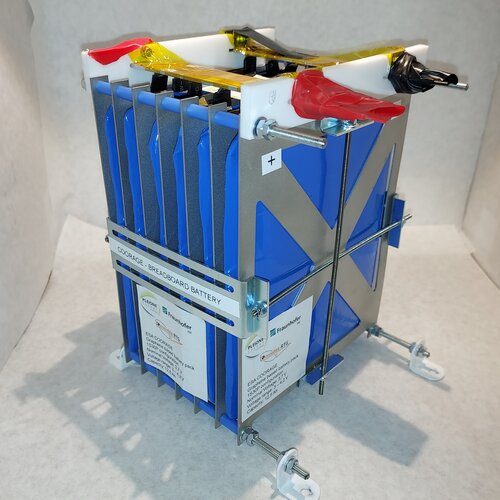
Harder than diamond and more electrically conductive than copper while also a million times thinner than paper: graphene is the single greatest discovery of 21st century materials science, and ESA has been working to benefit from its miraculous properties. A project to add ultra-thin graphene to traditional Lithium ion cells offers enhanced capacity and cycle life for future space batteries, which can now be manufactured in a cheaper, greener way – swapping toxic solvent for water and plant-based cellulose.
Vega-C pre-launch press briefing
 Video:
00:43:03
Video:
00:43:03
Watch the replay of the Q&A session with the media to learn more about the preparations for the upcoming launch of Vega-C. The inaugural flight of this new rocket in the Vega family is currently planned on 13 July 2022. Speakers include Stefano Bianchi, ESA Head of Flight Programmes Department, Benoit Pouffary, ESA Vega & Space Rider Launch System Engineering Manager, Ettore Scardecchia, Avio Head of Engineering and Mario Cosmo, ASI Director of Science and Research.
Smart competition for clever navigation at NAVISP Industry Days
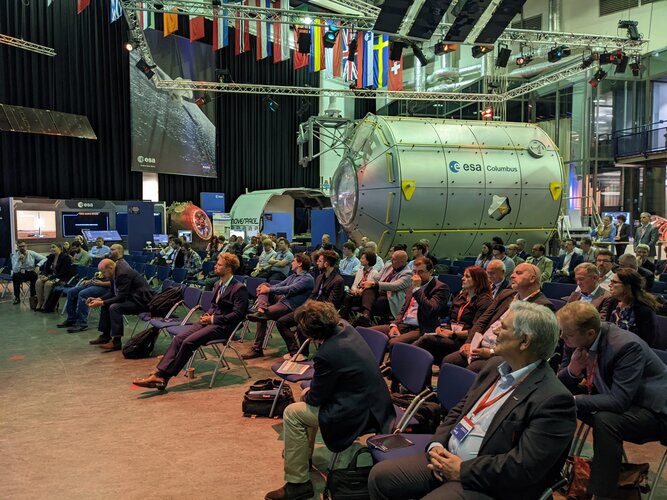
Europe’s leading companies and research institutes working on positioning, navigation, and timing (PNT) technologies met at ESA’s technical heart in the Netherlands in mid-June for this year’s NAVISP Industry Days, devoted to the latest developments in the Agency’s Navigation Innovation and Support Programme.
Why Does the Inside of the Solar System Not Spin Faster
 The motion of a tiny number of charged particles may solve a longstanding mystery about thin gas disks rotating around young stars, according to a new study from Caltech.
These features, called accretion disks, last tens of millions of years and are an early phase of solar system evolution. They contain a small fraction of the mass of the star around which they swirl; imagine a Saturn-like
The motion of a tiny number of charged particles may solve a longstanding mystery about thin gas disks rotating around young stars, according to a new study from Caltech.
These features, called accretion disks, last tens of millions of years and are an early phase of solar system evolution. They contain a small fraction of the mass of the star around which they swirl; imagine a Saturn-like AIR and Nigerian Space Agency sign MOU to collaborate on agriculture monitoring
 On July 4, 2022, the Aerospace Information Research Institute (AIR), Chinese Academy of Sciences (CAS) signed a memorandum of understanding (MOU) in Beijing through an online event with the National Space Research and Development Agency (NASRDA) of Nigeria to boost collaboration on crop monitoring with the goal to help the country achieve Zero Hunger goal, which is among 17 sustainable developme
On July 4, 2022, the Aerospace Information Research Institute (AIR), Chinese Academy of Sciences (CAS) signed a memorandum of understanding (MOU) in Beijing through an online event with the National Space Research and Development Agency (NASRDA) of Nigeria to boost collaboration on crop monitoring with the goal to help the country achieve Zero Hunger goal, which is among 17 sustainable developme Synspective releases First Image from its Small SAR Satellite "StriX-ss" that captures 3 cities around the world
 Synspective Inc., a SAR satellite data and analytic- solution provider, announced that it has successfully acquired its first image from its second SAR satellite, "StriX-ss".
"StriX-ss" was launched by Rocket Lab's Electron from New Zealand's Mahia Peninsula launch site on March 1, 2022 (JST) and put into target orbit at an altitude of 561km in a sun-synchronous orbit (SSO). Since then, it
Synspective Inc., a SAR satellite data and analytic- solution provider, announced that it has successfully acquired its first image from its second SAR satellite, "StriX-ss".
"StriX-ss" was launched by Rocket Lab's Electron from New Zealand's Mahia Peninsula launch site on March 1, 2022 (JST) and put into target orbit at an altitude of 561km in a sun-synchronous orbit (SSO). Since then, it Airbus to provide 42 satellite platforms and services to Northrop Grumman for the US Space Development Agency program
 Airbus U.S. Space and Defense, Inc., has been contracted to provide 42 satellite platforms as well as assembly, integration, and test (AIT), launch, and space vehicle commissioning support services to Northrop Grumman to satisfy the U.S. Space Development Agency's (SDA) Tranche 1 Transport Layer prototype constellation (T1TL) award.
The Transport Layer will serve as the backbone for SDA's
Airbus U.S. Space and Defense, Inc., has been contracted to provide 42 satellite platforms as well as assembly, integration, and test (AIT), launch, and space vehicle commissioning support services to Northrop Grumman to satisfy the U.S. Space Development Agency's (SDA) Tranche 1 Transport Layer prototype constellation (T1TL) award.
The Transport Layer will serve as the backbone for SDA's 

